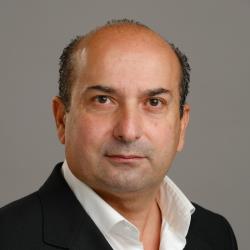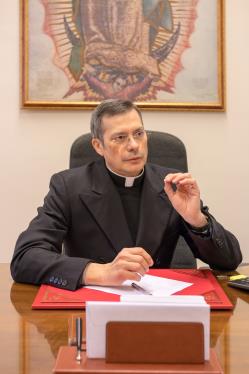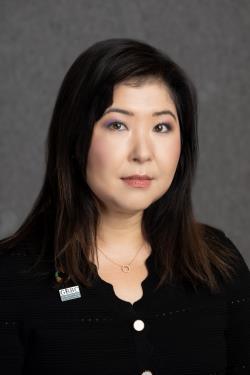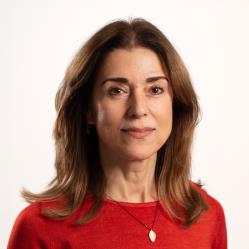Blockchain and Biometric-based Digital Identity Solution
United Nations Joint Staff Pension Fund
Session 366
The UNJSPF session will showcase its digital identity solution implemented for the 84,000 UN retirees and beneficiaries, residing in more than 190 countries.
The session will also include the latest news about the progress being made with the UN Digital Identity, which has been built on top of the technological design and infrastructure of the UNJSPF solution.
The session is expected to highlight tangible outcomes by demonstrating the significant potential of blockchain and biometrics-based digital identity solutions to address the unique needs and challenges faced by the aging population, ultimately leading to greater digital inclusion, security, and empowerment.
For media inquiries, please contact Mirko Montuori, Public Information Officer, UNJSPF:
mirko.montuori@un.org

Mr. Dell'Accio serves as Chief Information Officer at the United Nations Joint Staff Pension Fund since January 2017. Previously served for 14 years at the United Nations as Information Security Officer and Chief IT Auditor. Mr. Dell'Accio holds a Master of Laws in Information Technology and a number of certifications as Lead Auditor, Internal Auditor, Information System Auditor, Information Security Manager, Blockchain Security Professional, and Blockchain Maturity Lead Assessor.
Expert in governance and Assurance of Information Systems, Blockchains, DLT, and Digital Identity solutions underpinning United Nations Global Operations and Critical Infrastructures.
Committed to responsible and ethical design, use, and assessment of Emerging Technologies, to serve the Broader Goals of the United Nations, Organizational Integrity, and Societal Benefit.
Dedicated to compliance with International Standards and Professional Best Practices, for governing, managing, auditing, and securing global information systems, protecting data and privacy.
Focused on implementing Self-Assessment, Auditing, and Risk Management processes to:
- Evaluate the impact of algorithms on stakeholders, particularly in terms of potential negative effects, upholding the highest ethical standards, ensuring transparency, and preventing biases or unfairness; and
- Ensure trust, transparency, fairness, and accountability of automated decision-making systems.

Msgr. Lucio Adrián Ruiz born in Argentina in 1965, was ordained Diocesan Priest in 1990.
Licentiate of Dogmatic Theology at the Pontifical University of the Holy Cross, Rome (thesis in Theology of Communication); Master in Business Administration (MBA), and Doctorate (PhD) from the Universidad Politécnica de Madrid, Superior Technical School of Telecommunications Engineering, in the Biomedical Engineering program.
He has been IT-Assessor of the Argentine Episcopal Conference; Executive Secretary of the System Office of the Latin American Episcopal Council (CELAM) Bogota and Technical Coordinator of the Digital Network of the Church in Latin America (RIIAL); President of the Center for Training and Software Development for the Church in Latin America Nuestra Señora de Guadalupe; Systems Manager for the Congregation for the Clergy and collaborator of the Pontifical Council for Social Communications.
He has taught Digital Technologies at the Pontifical University of the Holy Cross, Rome and Meta-languages of communication at the Instituto Teológico Pastoral, (ITEPAL), Colombia.
He has addressed numerous conferences, seminars and written articles on the subject of the Church in the Digital Age.
Head Office of the Vatican Internet Service of the Direction of Telecommunication, Vatican until June 2015, when he was appointed Secretary of the new Dicastery for Communication.

Sandra is a proponent for ‘human-centric tech’. From investment banking and currency markets to blockchain technology, she is an early angel investor and advocate of cryptocurrencies and digital assets. She currently serves as the CEO of Global Blockchain Business Council (GBBC), the world’s largest leading Swiss-based non-for-profit association with more than 500 institutional members, 301 ambassadors, across 117 jurisdictions and disciplines.
In 2023, she was appointed onto the CFTC Commissioner Caroline Pham’s Global Markets Advisory Committee (GMAC), Digital Asset Market Subcommittee (DAMS) and cochairs the Taxonomy and Tokenization Infrastructure workstreams within the subcommittee. She was previously appointed as the Senate representative of the New York State Digital Currency Task Force, and serves on the AIFC Fintech Council (Kazakhstan), World Economic Forum’s Digital Currencies Governance Consortium, International Securities Services Association’s DLT & ISO Standards, GI Trust FATF Travel Rule Standards Task Force (South Korea), GBBC’s Global Standards Mapping Initiative, Blockchain for Climate (BxC) Board, Salesforce’s AI Advisory Board, Filecoin Foundation Advisory Board, United Nations World Food Programme (WFP) Innovation Accelerator Advisory Council, and several government Convergence AI working groups and councils as well as Board director of several fintech start-ups.
Sandra was a founding member of many of the earliest blockchain associations including Hyperledger Foundation, The Linux Foundation, the Post Trade Distributed Ledger Group (PTDL) and the Enterprise Ethereum Alliance (EEA).
She is a frequent guest lecturer and hackathon judge at universities discussing topics from fintech to data privacy and harnessing emerging technologies to solve real world problems and has testified and presented in front of governments including the U.S. Senate Committee - Agriculture, Nutrition & Forestry, UK House of Lords, Economic Affairs Committee, European Parliament, South Korea’s National Assembly, U.S. Senate Committee on the Judiciary, in both closed door and public forums.
Whilst at CME Group, she headed FX & Metals Research & Product Development and founded a new business unit, Digitization. Sandra and her team created the CME CF Bitcoin pricing index and reference rate, CME Bitcoin Futures, and post trade, clearing and settlement solutions.
She and her team filed the first set of crypto derivatives patents with the US Patent & Trademark Office (USPTO). Sandra was one of the corporate digital asset pioneers to recognize the potential of this technology and its many applications; she presented at one of the first CFTC Technology Advisory Committee (TAC) on the potential of blockchain technology on February 23, 2016. Previously, she was a London-based derivatives banker at Morgan Stanley and Deutsche Bank in the foreign exchange and interest rate markets.
Sandra holds a M.B.A. in Finance and Accounting from London Business School, studied Computer Science at Columbia University, School of Continuing Studies and earned a double B.A. degree from Yale University in History (Military) and Studies in the Environment.

Wakefield Scott Stornetta is an American physicist and scientific researcher. His 1991 paper "How to Time-Stamp a Digital Document”, co-authored with Stuart Haber, won the 1992 Discover Award for Computer Software and is considered to be one of the most important papers in the development of cryptocurrencies.
Co-developer, with Stuart Haber, of the early blockchain.
He invests in early-stage technology companies, sits on various boards, mentors beginning entrepreneurs, and lectures on computer science, including its social and economic implications.
Currently Partner and Chief Scientist at Yugen Partners.

Dimitra Ralli was appointed Officer-in-Charge Programme Director, UN System Digital ID Programme in March 2024. She provides strategic and operational leadership as well as an oversight to the UN System Digital ID Programme. Ms. Ralli joined UNICC 25 years ago, bringing a wealth of international experience and UN system expertise. At UNICC she has held leadership positions for over 10 years in the Application Support and Service Management Units, and most recently as Officer-in-Charge Chief Operations Officer leading the Operations Division. She has played a significant role in several successful transformational initiatives. Ms. Ralli seeks to support innovative ideas and adoption of new digital solutions that modernize and increase efficiency to continue delivering value coupled with growth.
Prior to UNICC, Ms. Ralli worked as a business analyst and developer providing services to UNECE and OHCHR. Ms. Ralli’s educational background is in Applied Informatics with specialization in computing, data processing and econometrics.
-
 C7. ICT applications: benefits in all aspects of life — E-government
C7. ICT applications: benefits in all aspects of life — E-government
-
 C10. Ethical dimensions of the Information Society
C10. Ethical dimensions of the Information Society
Action Line C7 ICT applications: benefits in all aspects of life - E-government. Speakers will discuss the use of emerging technology and its benefit for people at all levels and all ages, including retirees.
-
 Goal 3: Ensure healthy lives and promote well-being for all
Goal 3: Ensure healthy lives and promote well-being for all
-
 Goal 8: Promote inclusive and sustainable economic growth, employment and decent work for all
Goal 8: Promote inclusive and sustainable economic growth, employment and decent work for all
-
 Goal 17: Revitalize the global partnership for sustainable development
Goal 17: Revitalize the global partnership for sustainable development
The session will showcase the use of blockchain and emerging technology for the benefit of the elder, with a strong link to SDGs 3, 8 and 17. In particular, the UNJSPF Digital Certificate of Entitlement (DCE) and UN Digital ID apps will be presented and showcased as practical applications.
The DCE makes use of new technologies to develop a user-friendly and cost-effective solution. Biometric technology such as facial recognition was used to authenticate beneficiaries’ identities. The facial recognition functionality and user-friendliness of the application are being continuously perfected. The solution is now being incorporated into other innovation plans involving digital identity within the United Nations System at large. In addition, the DCE application incorporated emerging geolocation technology that can capture beneficiaries’ physical locations to validate their places of residence. The application also embedded blockchain technology to have a traceable, immutable and independently auditable record of the certification process.
The UNJSPF expects that the DCCE application will lead to expanding the scope of digital services offered by the Fund to its clients, further reducing the reliance on paper and therefore contributing to greater environmental sustainability in the longer term. When more retirees and beneficiaries adopt the digital solution, the need for printing and mailing paper forms will diminish, and the time taken for completing transactions (end-to-end) will decrease. This has the potential to save tens of thousands of pieces of paper each year, postal mailing, and related cost involved in their handling and processing, which in turn will significantly reduce the carbon footprints associated with the day-to-day operations of the Fund worldwide.
The UN Digital ID is a digital wallet for UN personnel that will enable separating staff of the United Nations and other participating organizations to transmit their personal information via an app in a secured way, enhancing data accountability. It provides visibility to employees on data held by the organization, with a view to allowing them to resolve update any incorrect data and ensuring data quality. Through the UN Digital ID, UN staff members separating from their organizations should eventually be able to resolve any incorrect data in advance of separation, to ensure data quality. The app, to be launched in phases, will enable the employer and the separating staff member to share verified data with UNJSPF via the staff Digital ID wallet so their pension benefits can be processed with minimum delay.
https://www.unjspf.org/category/newsroom/
https://www.unjspf.org/for-clients/digital-certificate-of-entitlement/
https://www.linkedin.com/company/1299401/
https://whatsapp.com/channel/0029VaRw7paBVJl1wWxFpu3m
